Fleurs du Mal Magazine


Or see the index
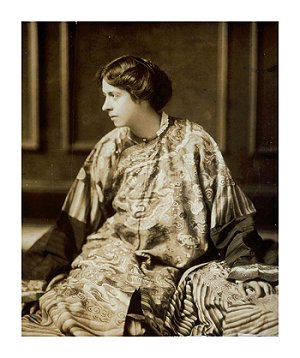
Eunice Tietjens
(1884 – 1944)
The Beggar
“Christ! What is that–that–Thing?
Only a beggar, professionally maimed, I think.”
Across the narrow street it lies, the street where little
children are.
It is rocking its body back and forth, back and forth,
ingratiatingly, in the noisome filth.
Beside the body are stretched two naked stumps of
flesh, on one the remnant of a foot. The wounds
are not new wounds, but they are open and they
fester. There are flies on them.
The Thing is whining, shrilly, hideously.
“Professionally maimed, I think.”
Christ!
(Hwai Yuen)
Eunice Tietjens poetry
fleursdumal.nl magazine
More in: Archive S-T, Tietjens, Eunice
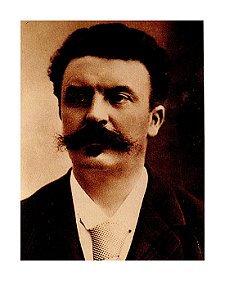
Guy de Maupassant
(1850-1893)
DERNIÈRE SOIRÉE PASSÉE AVEC MA MAÎTRESSE
Il fallait la quitter, et pour ne plus me voir
Elle partait, mon Dieu, c’était le dernier soir.
Elle me laissait seul ; cette femme cruelle
Emportait mon amour et ma vie avec elle.
Moi je voulus encore errer comme autrefois
Dans les champs et l’aimer une dernière fois.
La nuit nous apportait et l’ombre et le silence,
Et pourtant j’entendais comme une voix immense,
Tout semblait animé par un souffle divin.
La nature tremblait, j’écoutais et soudain
Un étrange frisson troubla toute mon âme.
Haletant, un moment j’oubliai cette femme
Que j’aimais plus que moi. Le vent nous apportait
Mille sons doux et clairs que l’écho répétait.
Ce n’était plus de l’air le calme et frais murmure,
Mais c’était comme un souffle étreignant la nature,
Un souffle, un souffle immense, errant, animant tout,
Qui planait et passait, me rendant presque fou,
Un son mystérieux et qui, sur son passage,
Réveillait et frappait les échos du bocage.
Tout vivait, tout tremblait, tout parlait dans les bois,
Comme si, pour fêter le plus puissant des rois,
Et l’insecte et l’oiseau et l’arbre et le feuillage
Parlaient, quand tout dormait, un sublime langage.
Je restai frémissant : ce bruit mystérieux,
C’était Dieu descendu des cieux.
C’était ce Dieu puissant si grand et solitaire
Qui venait oublier sa grandeur sur la terre.
Dieu las et fatigué de sa divinité,
Las d’honneur, de puissance et d’immortalité,
Des éternels ennuis où sa grandeur l’enchaîne,
Qui venait partager notre nature humaine.
Il avait choisi l’heure où tout dort et se tait,
Où l’homme, indifférent à tout ce que Dieu fait,
Attaché seulement à ses soins mercenaires,
Prend un peu de repos qu’il dérobe aux affaires.
Car c’était aussi l’heure où ce Dieu généreux
Peut bénir et donner la main aux malheureux,
L’heure où celui qui souffre et gémit en silence,
Qui craint pour son malheur la froide indifférence,
Délivré du fardeau de l’égoïsme humain,
Sans craindre la pitié peut planer libre enfin.
Dieu vient le consoler, il soutient sa misère,
Il rend ses pleurs plus doux, sa douleur moins amère,
Il verse sur sa plaie un baume bienfaisant.
D’autres craignent encore un oeil indifférent,
Et les regards de l’homme et les bruits de la terre.
Ils cherchent aussi l’heure où tout est solitaire,
Dieu les voit, il bénit le bonheur des amants.
Invisible témoin, il entend leurs serments.
Il aime cet amour qu’il ne goûtera pas
Et dans les bois, la nuit, il protège leurs pas.
Il était là, son souffle errait sur la nature,
Paraissait éveiller comme un vaste murmure,
Tout ce qu’il a formé s’animait et, tremblant,
S’agitait au contact de ce Dieu tout-puissant,
Et tout parlait de lui, le vent sous le feuillage,
Et l’arbuste, et le flot caressait le rivage,
Et tous ces bruits divers ne formaient qu’une voix :
C’était Dieu qui parlait au milieu des grands bois.
Tous deux nous l’écoutions et nous versions des larmes ;
Quand on va se quitter, l’amour a tant de charmes !
Et nos pleurs, qui tombaient comme des diamants,
Goutte à goutte brillaient sur les herbes des champs.
Mais de cette belle soirée
Et de ma maîtresse adorée
Que restait-il le lendemain ?
Seul le pâtre de grand matin,
En conduisant au pâturage
Son gras troupeau, vit sur l’herbage
Les quelques gouttes de nos pleurs,
Seule marque de nos douleurs ;
Mais il les prit pour la rosée.
“L’herbe n’est point encor séchée”,
Se dit-il en pressant le pas.
Hélas ! il ne soupçonna pas
Que de chagrins et de misères
Cachait cette eau sur les bruyères.
Et ses brebis qui le suivaient
Broutaient les herbes et buvaient
Nos pleurs sans arrêter leur course,
Mais rien n’en a trahi la source.
1868
Dernière soirée passée avec ma maîtresse a paru dans la Revue des Revues du 1er juin 1900.
Guy de Maupassant poetry
fleursdumal.nl magazine
More in: Archive M-N, Guy de Maupassant, Maupassant, Guy de

The Sorrows of Young Werther (43) by J.W. von Goethe
SEPTEMBER 4.
It is even so! As nature puts on her autumn tints it becomes autumn with
me and around me. My leaves are sere and yellow, and the neighbouring
trees are divested of their foliage. Do you remember my writing to you
about a peasant boy shortly after my arrival here? I have just made
inquiries about him in Walheim. They say he has been dismissed from his
service, and is now avoided by every one. I met him yesterday on the
road, going to a neighbouring village. I spoke to him, and he told me
his story. It interested me exceedingly, as you will easily understand
when I repeat it to you. But why should I trouble you? Why should I
not reserve all my sorrow for myself? Why should I continue to give you
occasion to pity and blame me? But no matter: this also is part of my
destiny.
At first the peasant lad answered my inquiries with a sort of subdued
melancholy, which seemed to me the mark of a timid disposition; but, as
we grew to understand each other, he spoke with less reserve, and openly
confessed his faults, and lamented his misfortune. I wish, my dear
friend, I could give proper expression to his language. He told me
with a sort of pleasurable recollection, that, after my departure, his
passion for his mistress increased daily, until at last he neither knew
what he did nor what he said, nor what was to become of him. He could
neither eat nor drink nor sleep: he felt a sense of suffocation; he
disobeyed all orders, and forgot all commands involuntarily; he seemed
as if pursued by an evil spirit, till one day, knowing that his mistress
had gone to an upper chamber, he had followed, or, rather, been drawn
after her. As she proved deaf to his entreaties, he had recourse to
violence. He knows not what happened; but he called God to witness that
his intentions to her were honourable, and that he desired nothing more
sincerely than that they should marry, and pass their lives together.
When he had come to this point, he began to hesitate, as if there
was something which he had not courage to utter, till at length he
acknowledged with some confusion certain little confidences she had
encouraged, and liberties she had allowed. He broke off two or three
times in his narration, and assured me most earnestly that he had
no wish to make her bad, as he termed it, for he loved her still as
sincerely as ever; that the tale had never before escaped his lips,
and was only now told to convince me that he was not utterly lost and
abandoned. And here, my dear friend, I must commence the old song which
you know I utter eternally. If I could only represent the man as he
stood, and stands now before me, could I only give his true expressions,
you would feel compelled to sympathise in his fate. But enough: you,
who know my misfortune and my disposition, can easily comprehend
the attraction which draws me toward every unfortunate being, but
particularly toward him whose story I have recounted.
On perusing this letter a second time, I find I have omitted the
conclusion of my tale; but it is easily supplied. She became reserved
toward him, at the instigation of her brother who had long hated him,
and desired his expulsion from the house, fearing that his sister's
second marriage might deprive his children of the handsome fortune they
expected from her; as she is childless. He was dismissed at length; and
the whole affair occasioned so much scandal, that the mistress dared not
take him back, even if she had wished it. She has since hired another
servant, with whom, they say, her brother is equally displeased, and
whom she is likely to marry; but my informant assures me that he himself
is determined not to survive such a catastrophe.
This story is neither exaggerated nor embellished: indeed, I have
weakened and impaired it in the narration, by the necessity of using the
more refined expressions of society.
This love, then, this constancy, this passion, is no poetical fiction.
It is actual, and dwells in its greatest purity amongst that class of
mankind whom we term rude, uneducated. We are the educated, not the
perverted. But read this story with attention, I implore you. I am
tranquil to-day, for I have been employed upon this narration: you see
by my writing that I am not so agitated as usual. I read and re-read
this tale, Wilhelm: it is the history of your friend! My fortune has
been and will be similar; and I am neither half so brave nor half so
determined as the poor wretch with whom I hesitate to compare myself.
The Sorrows of Young Werther (Die Leiden des jungen Werther) by J.W. von Goethe. Translated by R.D. Boylan.
To be continued
fleursdumal.nl magazine
More in: -Die Leiden des jungen Werther, Goethe, Johann Wolfgang von

Alfred Lichtenstein
(1889-1914)
Der Athlet
Einer ging in zerrissenen Hausschuhen
Hin und her durch das kleine Zimmer,
Das er bewohnte.
Er sann über die Geschehnisse,
Von denen in dem Abendblatt berichtet war.
Und gähnte traurig, wie nur jemand gähnt,
Der viel und Seltsames gelesen hat –
Und der Gedanke überkam ihn plötzlich,
Wie wohl den Furchtsamen die Gänsehaut
Und wie das Aufstoßen den Übersättigten,
Wie Mutterwehen:
Das große Gähnen sei vielleicht ein Zeichen,
Ein Wink des Schicksals, sich zur Ruh zu legen.
Und der Gedanke ließ ihn nicht mehr los.
Und also fing er an, sich zu entkleiden …
Als er ganz nackt war, hantelte er etwas.
Alfred Lichtenstein poetry
fleursdumal.nl magazine
More in: *War Poetry Archive, Archive K-L, Expressionism, Lichtenstein, Alfred

Op zondag 3 augustus 2014 vindt in de boeken- en Hanzestad Deventer de 26e editie plaats van de Deventer Boekenmarkt.
In totaal zijn 878 kramen gevuld met vele duizenden boeken: ruim 6 kilometer markt met deelname van gerenommeerde boekhandelaren en antiquariaten uit heel Nederland. De markt begint om 9.30 uur, maar al om 7.00 uur zijn er de eerste bezoekers.
Deventer Boekenmarkt – de grootste van Europa – Zondag 3 augustus 2014
Voorafgaand en tijdens de Deventer Boekenmarkt worden er tal van activiteiten in Deventer georganiseerd rondom het thema boeken.
De avond voorafgaand aan de Boekenmarkt, op zaterdag 2 augustus, vindt poëziefestival Het Tuinfeest plaats.
Deelnemende dichters zijn: Erik Bindervoet, Pim te Bokkel, Pieter Boskma, Heleen Bosma, Annelie David, Hanneke van Eijken, Hélène Gelèns, Piet Gerbrandy, Annemieke Gerrist, Erik Jan Harmens, Marjolijn van Heemstra, Judith Herzberg, Tjitske Jansen, Antoine de Kom, Anton Korteweg, Astrid Lampe, Lieke Marsman, Els Moors, Martijn den Ouden, Froukje van der Ploeg, Esther Porcelijn, K. Schippers, Joost Zwagerman en Wim Brands.
Op zaterdag 2 en zondag 3 augustus, van 12.00-15.00 uur en 17.00-20.00 uur, vindt voor het eerst in de Bergkerk Margriet Spektakel-op-Tafel plaats.
# meer informatie op website Deventer Boekenmarkt
fleursdumal.nl magazine
More in: - Book Lovers, Art & Literature News, Brands, Wim, Jansen, Tjitske, Porcelijn, Esther, Schippers, K., Zwagerman, Joost
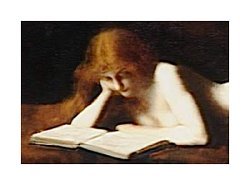
Eduard Mörike
(1822-1875)
Josephine
Das Hochamt war. Der Morgensonne Blick
Glomm wunderbar im süßen Weihrauchscheine;
Der Priester schwieg; nun brauste die Musik
Vom Chor herab zur Tiefe der Gemeine.
So stürzt ein sonnetrunkner Aar
Vom Himmel sich mit herrlichem Gefieder,
So läßt Jehovens Mantel unsichtbar
Sich stürmend aus den Wolken nieder.
Dazwischen hört ich eine Stimme wehen,
Die sanft den Sturm der Chöre unterbrach;
Sie schmiegte sich mit schwesterlichem Flehen
Dem süß verwandten Ton der Flöte nach.
Wer ist’s, der diese Himmelsklänge schickt?
Das Mädchen dort, das so bescheiden blickt.
Ich eile sachte auf die Galerie;
Zwar klopft mein Herz, doch tret ich hinter sie.
Hier konnt ich denn in unschuldsvoller Lust
Mit leiser Hand ihr festlich Kleid berühren,
Ich konnte still, ihr selber unbewußt,
Die nahe Regung ihres Wesens spüren.
Doch, welch ein Blick und welche Miene,
Als ich das Wort nun endlich nahm,
Und nun der Name Josephine
Mir herzlich auf die Lippen kam!
Welch zages Spiel die braunen Augen hatten!
Wie barg sich unterm tiefgesenkten Schatten
Der Wimper gern die ros’ge Scham!
Und wie der Mund, der eben im Gesang
Die Gottheit noch auf seiner Schwelle hegte,
Sich von der Töne heilgem Überschwang
Zu mir mit schlichter Rede herbewegte!
O dieser Ton – ich fühlt es nur zu bald,
Schlich sich ins Herz und macht es tief erkranken;
Ich stehe wie ein Träumer in Gedanken,
Indes die Orgel nun verhallt,
Die Sängerin vorüberwallt,
Die Kirche aufbricht und die Kerzen wanken.
Eduard Mörike poetry
fleursdumal.nl magazine
More in: Archive M-N, CLASSIC POETRY
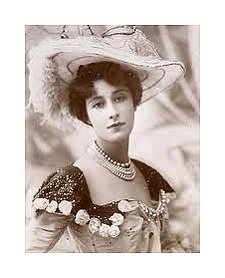
Renée Vivien
(1877-1909)
À une Femme
Tendre à qui te lapide et mortelle à qui t’aime,
Faisant de l’attitude un frisson de poème,
O Femme dont la grâce enfantine et suprême
Triomphe dans la fange et les pleurs et le sang,
Tu n’aimes que la main qui meurtrit ta faiblesse,
La parole qui trompe et le baiser qui blesse,
L’antique préjugé qui meurt avec noblesse
Et le désir d’un jour qui sourit en passant.
Férocité passive, âme légère et douce,
Pour t’attirer, il faut que le geste repousse :
Ta chair inerte appelle, en râlant, la secousse
Et l’effort sans beauté du mâle triomphant.
Esclave du hasard, des choses et de l’heure,
Être ondoyant, en qui rien de vrai ne demeure,
Tu n’accueilles jamais la passion qui pleure
Ni l’amour qui languit sous ton regard d’enfant.
Le baume du banal et le fard du factice,
L’absurdité des lois, la vanité du vice
Et l’amant dont l’orgueil contente ton caprice,
Suffisent à ton cœur sans rêve et sans espoir.
Jamais tu ne t’éprends de la grâce d’un songe,
D’un reflet dont le charme expirant se prolonge,
D’un écho dans lequel le souvenir se plonge,
Jamais tu ne pâlis à l’approche du soir.
Cendres et Poussières, 1902
Renée Vivien poetry
fleursdumal.nl magazine
More in: Archive U-V, Renée Vivien, Vivien, Renée
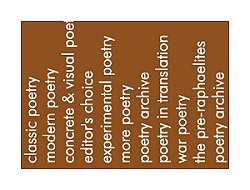
Verdwijnpunt
The past is a different country:
They do things differently there.
(L.P. Hartley)
Zij die deze kasseien en sporen legden
gaven hun lijven al lang geleden terug.
Maar eerder, eerder zegden zij dat ze
geloofden. Zegden zij dat ze wel wisten
hoe alles zat. Hun onherinnerde dromen
wemelden van de oorlog die nog moest
komen, duister als de kleur die de rivier
’s avonds heeft. Er zweemt een heimwee
over deze stenen, maar het is niet klaar
waarnaar. Moet er eigenlijk niet een dun
lijntje om alles heen? Met richtingwijzers?
Toekomst heeft de kraag ruig omhoog.
Bert Bevers
verschenen in de bloemlezing Schaduw, samenstelling Frank De Vos, Hoboken, 2014
fleursdumal.nl magazine
More in: Archive A-B, Bevers, Bert

The Sorrows of Young Werther (42) by J.W. von Goethe
AUGUST 4.
I am not alone unfortunate. All men are disappointed in their hopes, and
deceived in their expectations. I have paid a visit to my good old woman
under the lime-trees. The eldest boy ran out to meet me: his exclamation
of joy brought out his mother, but she had a very melancholy look. Her
first word was, "Alas! dear sir, my little John is dead." He was the
youngest of her children. I was silent. "And my husband has returned
from Switzerland without any money; and, if some kind people had not
assisted him, he must have begged his way home. He was taken ill with
fever on his journey." I could answer nothing, but made the little one
a present. She invited me to take some fruit: I complied, and left the
place with a sorrowful heart.
AUGUST 21.
My sensations are constantly changing. Sometimes a happy prospect opens
before me; but alas! it is only for a moment; and then, when I am
lost in reverie, I cannot help saying to myself, "If Albert were
to die?--Yes, she would become--and I should be"--and so I pursue a
chimera, till it leads me to the edge of a precipice at which I shudder.
When I pass through the same gate, and walk along the same road which
first conducted me to Charlotte, my heart sinks within me at the change
that has since taken place. All, all, is altered! No sentiment, no
pulsation of my heart, is the same. My sensations are such as would
occur to some departed prince whose spirit should return to visit the
superb palace which he had built in happy times, adorned with costly
magnificence, and left to a beloved son, but whose glory he should find
departed, and its halls deserted and in ruins.
SEPTEMBER 3.
I sometimes cannot understand how she can love another, how she dares
love another, when I love nothing in this world so completely, so
devotedly, as I love her, when I know only her, and have no other
possession.
The Sorrows of Young Werther (Die Leiden des jungen Werther) by J.W. von Goethe. Translated by R.D. Boylan.
To be continued
fleursdumal.nl magazine
More in: -Die Leiden des jungen Werther, Goethe, Johann Wolfgang von
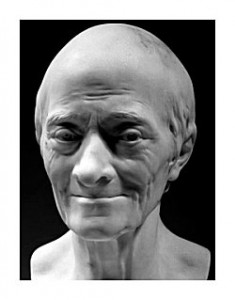
Voltaire
(1694-1778)
À Uranie
Je vous adore, ô ma chère Uranie !
Pourquoi si tard m’avez-vous enflammé ?
Qu’ai-je donc fait des beaux jours de ma vie ?
Ils sont perdus ; je n’avais point aimé.
J’avais cherché dans l’erreur du bel âge
Ce dieu d’amour, ce dieu de mes désirs ;
Je n’en trouvai qu’une trompeuse image
Je n’embrassai que l’ombre des plaisirs.
Non, les baisers des plus tendres maîtresses ;
Non, ces moments comptés par cent caresses,
Moments si doux et si voluptueux,
Ne valent pas un regard de tes yeux.
Je n’ai vécu que du jour où ton âme
M’a pénétré de sa divine flamme ;
Que de ce jour où, livré tout à toi,
Le monde entier a disparu pour moi.
Ah ! quel bonheur de te voir, de t’entendre !
Que ton esprit a de force et d’appas !
Dieux ! que ton cœur est adorable et tendre !
Et quels plaisirs je goûte dans tes bras !
Trop fortuné, j’aime ce que j’admire.
Du haut du ciel, du haut de ton empire,
Vers ton amant tu descends chaque jour,
Pour l’enivrer de bonheur et d’amour.
Belle Uranie, autrefois la Sagesse
En son chemin rencontra le Plaisir ;
Elle lui plut ; il en osa jouir ;
De leurs amours naquit une déesse,
Qui de sa mère a le discernement,
Et de son père a le tendre enjouement.
Cette déesse, ô ciel ! qui peut-elle être
Vous, Uranie, idole de mon cœur,
Vous que les dieux pour la gloire ont fait naître,
Vous qui vivez pour faire mon bonheur.
1734
Voltaire poetry
fleursdumal.nl magazine
More in: Archive U-V, Voltaire

My Voice
Editor: Sarah Maguire
Translators: Various
Original language: Various
Published by: Bloodaxe Books, 2014
As this gloriously diverse, revelatory selection of translations from the Poetry Translation Centre’s first decade proves, nothing has invigorated poetry in English more than translation.
Here you will find 111 brilliant poems translated from 23 different languages (ranging from Arabic to Zapotec: all the original scripts are included) by 45 of the world’s leading poets. Arranged on a journey from exile to ecstasy, these powerful poems have been co-translated by some of the UK’s best-loved poets including Jo Shapcott, Sean O’Brien, Lavinia Greenlaw, W N Herbert, Mimi Khalvati and Nick Laird.
Founded by Sarah Maguire, the Poetry Translation Centre aims to transform English verse through engaging with the rich poetic traditions of the UK’s recent immigrant communities for whom poetry is of overwhelming importance. Reading these Somali, Afghan, Sudanese and Kurdish poets (26 countries are represented), you will understand why their scintillating and heartbreaking poems inspire such devotion.
 ‘This groundbreaking anthology extends the territory of English poetry through a series of generous translations that make welcome the magnificent poetic traditions of many communities now settled here’ – Carol Ann Duffy.
‘This groundbreaking anthology extends the territory of English poetry through a series of generous translations that make welcome the magnificent poetic traditions of many communities now settled here’ – Carol Ann Duffy.
# More information on website English PEN
See also on website PEN: Leading international poets visit the UK.
Celebrated poets from across the globe come to UK to celebrate launch of MYVOICE this July.
fleursdumal.nl magazine
More in: #More Poetry Archives, - Book News, Art & Literature News, REPRESSION OF WRITERS, JOURNALISTS & ARTISTS, TRANSLATION ARCHIVE
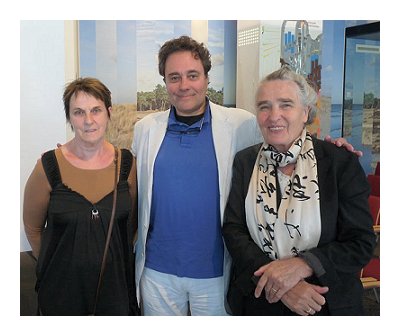
45ste Poetry International 2014
“Meisjes zijn het allermooist op aard”
door Carina van der Walt
2014 – 06 – 17
Woensdag 11 juni was een stralend zonnige dag in Rotterdam. Een dag voor mooie meisjes à la Raymond van het Groenewoud de Belgische zanger. Het was de eerste volle dag bij Poetry International na de Vlaggenparade en Festivalopening de vorige avond. Het dagprogramma werd uitgedeeld met een citaat van Jules Deelder als kop: Hoe langer je leeft / hoe korter het duurt. Jules is zeker het gezicht van de Rotterdamse dichterswereld als nachtburgemeester en na tien deelnames aan Poetry International tussen 1970 en 2000. Hij was ook op deze avond de gast van een programma met dezelfde titel. Daarom was het ook gepast dat de gasten bij binnenkomst direct met deze dichtregel uit zijn hand verwelkomd werden. De meerderheid van de activiteiten was gelokaliseerd in de Rotterdamse Schouwburg. In de stad waren fiets- en kunstroutes die alles te maken hadden met poëzie in de wijdste betekenis. Maar wie op een dag bezoek komt, moest keuzes maken.
In het Douw Egberts Café (DE Café) naast de tramhalte en 150 meter van de gloednieuw gerenoveerde stationshal, gingen we op het eerste programma af. Dit programma is een initiatief van Dean Bowen, die ook als gastheer optrad. De eerste twee gasten om 14:00 waren Véronique Pitollo uit Frankrijk en Antoine de Kom, VSB Poëzieprijswinnaar. We krijgen elk een hand out met een vertaling van Pitollos werk door Rokus Hofstede. Heel handig. Pitollo vertelde tijdens de introductie dat haar voorlezing niet het palet geeft van haar stijl, maar speciaal voor Poetry International geschreven is. Zij las voor uit HET MEISJE EN UTOPIEëN:
p.1
Kinderloze koningen en koninginnen krijgen aan het eind meestal een meisje.
Een meisje!
De kreet van teleurstelling weerklinkt in het hele koninkrijk. Ze zijn teleurgesteld.
Dat kind moet een belofte zijn van geschenken, voorspellingen rond de wieg, een prins en alles wat daaruit volgt. Men schat ziektes in, somt successen op.
Een levensweg, wat is dat? Grote verwachtingen in de lijnen van de hand, ja… Maar verder? Wie de slechte kaart trekt als de rollen van ‘vader, moeder, kind’ worden vergeven, zal het zich heugen.
p.2
Is ze eenmaal tot wasdom gekomen, dan stelt men zich het meisje voor aan de arm van een cavalier. Maar cavaliers gaan voorbij en meisjes blijven… het leven vliegt heen aan het stuur van een cabriolet.
(Geboren worden als meisje is een handicap die erop neerkomt dat je twee keer zo levend bent als een jongen).
p.3
Als zelfbevrijding de droom van de mensheid is, dan maakt het meisje er deel van uit.
Ze maakt deel uit van dat grote voorwaartse streven: die trage overtocht.
Voor knappe meisjes met een smalle taille is het makkelijker: volkomen onafhankelijke als ze zijn, worden ze bevoorrecht. Toch is de grond wankel voor een vurig jong ding, toch zijn de muren scheef.
Wat het meisje verklaart, zijn de gemiste treden.
De andere voegen zich bij de onbehoorlijke massa, de zusjes voor de spiegels.
Het is verbijsterend. Voor haar weerschijn grimas het lelijke wicht. Om dat ene mooie meisje te zijn tussen alle andere, moet je bedrog plegen met je spiegelbeeld.
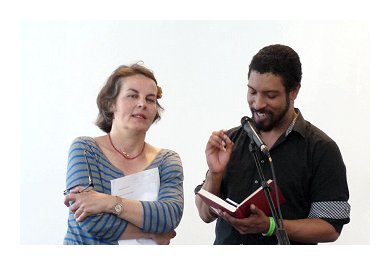 In een prozagedicht van veertien pagina’s vertelde Pitollo van alle ongemakken, verwachtingen en teleurstellingen van een koningsdochter. Uit het kleine publiek in DE Café merkte iemand achteraf overeenkomsten en verschillen op in het meisjesperspectief van de poëzie van Kreek Daey Ouwens. Er worden contactgegevens uitgeruild.
In een prozagedicht van veertien pagina’s vertelde Pitollo van alle ongemakken, verwachtingen en teleurstellingen van een koningsdochter. Uit het kleine publiek in DE Café merkte iemand achteraf overeenkomsten en verschillen op in het meisjesperspectief van de poëzie van Kreek Daey Ouwens. Er worden contactgegevens uitgeruild.
De tweede gast was Antoine de Kom. Hij las onder andere zijn gedichten made in honduras en hafez bashar maher voor uit de bekroonde bundel Ritmisch zonder string (2014). Op mijn vraag hoe hij zijn bezoek aan Zuid-Afrika ervoer, antwoordde hij met een lezing uit sea point:
ah tamanrasset zuidwaarts oh dood
geheel absurd ubuntu door de ander levend uwe dood
heeft hier ter hoogte van tamanrassat zijn grote voeten in het zand gelobd
en korstig ook zie ik een heel grote wrat. verder kan ik melden
dat dood luid snurkt. hij kan het niet helpen. tot diep in de nacht
zat hij te mailen en nu plagen hem talloze overlevenden
die hem slapeloos in hun sahara vrezen
klein zusje van dood is een woestijn die soms en langzaamaan sahel
wat groener wordt zodat je voeten zo te zien vanuit de hoogte hier of daar
wat nat wanneer ze aan de oever van een meer of meer rivier.
het mist. en je verwacht hem ieder ogenblik. waaraan herken
je hem? wat is zijn teken of besluit zodat hij aan je komt?
zijn zusje zwijgt. je weet nog wel: dood heeft een smoel
en wie weet is die kaaps in kaapstad
nu wordt dood toerist van alle kleuren thuis
erg druk was het tussen de vissen en heel warm toen de piloot opeens
zei: dat schip zinkt! het zinkt en daalde hij verder naar de haven
verderop. we hebben gevlogen rond de tafelberg de dichtheid van de townships
vastgesteld. na de vlekkeloze landing zagen we de waarheid onder ogen.
geen commissie die het na kan doen: dit is een verdrietig land
waar medemensen als verschrikte vogels uiteenstuiven wanneer
dood als mijn wit van deze bladzij hen te na komt
Het personage dood van dit gedicht van Antoine de Kom is “alive and well” aan de zuidpunt van Afrika. Wat kan ik erop zeggen? Behalve dat ook hierin een meisje voorkomt: het zusje van dood die zwijgt.
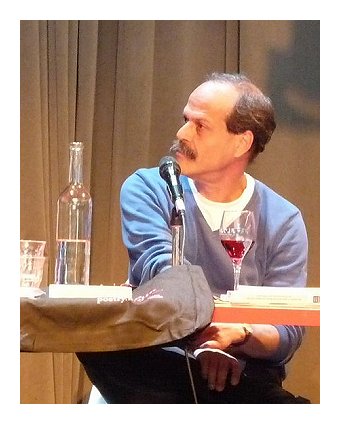
Ik ben eigenlijk gegaan voor mijn landgenoot Charl-Pierre Naudé, maar in de schouwburg van Rotterdam was hij nog nergens te zien. Tijdens de Poëziecafe met Daniël Dee (huidige stadsdichter van Rotterdam, maar geboren in Zuid-Afrika) kijk ik even bij De Huisdrukker rond. Zou Naudé ondertussen (na onze laatste ontmoeting in Maastricht) zo een grote snor hebben gekweekt? Ik stap op een man af met dezelfde postuur als Naudé en spreek hem aan. Nee, hij is de Turkse dichter Roni Margulies uit Istanbul. Hij is in NU aan de beurt bij Dee. Ik moet hem excuseren.
Zo leerde ik tijdens zijn zeer dynamische optrede over het programma A View with a Room. De initiatiefnemer is Eric Dullaert. Hij werkte samen met Poetry International. Margulies is nu zes weken “writer in residence” in Rotterdam Zuid. Hij is gefascineerd door thema’s als identiteit, migratie, grenzen, taal en onderdrukking. Hij heeft in deze tijd zeventien gedichten geschreven over het gebied rond de Maas. Voor Poetry International heeft Margulies een prachtig linnen doosje met tien van zijn zeventien gedichten samengesteld. Ik herkende de typische blik en vragen van iemand in de marge van een nieuwe samenleving. Ook Margulies heeft het over meisjes, kassa meisjes, in zijn gedicht Burcu, Yonca en Defne vertaald door Sytske Sötemann.
Burcu, Yonca en Defne
Om de dag loop ik de Dortselaan af
en koop bij Albert Hein brood en sigaretten,
en oude Franse kaas, diverse dranken,
en allerlei soorten varkensproducten.
De laatste keer zat Burcu achter de kassa,
daarvoor was het Yonca, een andere keer Defne.
Op hun kraag hebben ze allemaal een naamkaartje.
Ik zeg alleen “Dank je wel.”
Gisteren keek Burca naar de pakjes ham,
ze aarzelde, keek naar mij, twijfelde,
ten slotte was ze ervan overtuigd dat ik Turks was.
“Meneer,” zei ze, “wat u daar heeft gekocht is varken.”
“Dat weet ik,” zei ik, “Wij hebben dat niet,
daarom ben ik het gekocht. Soms heb ik er zin in.”
“Wie zijn wij?” dacht ik later,
toen ik op m’n gemak naar huis liep.
Zou Burca dat ook gedacht hebben,
toen ze me enigszins bezorgd nakeek:
“Hij is duidelijk geen Nederlander, maar
wat dan wel, is een beetje moeilijk te zeggen.”
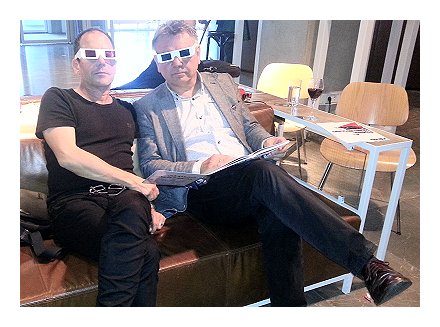
Uiteindelijk was het de tijd voor de avondprogramma’s. In de Kleine Zaal kwamen vroeg ’s avonds Adam Dickinson (Canada), Alfred Schaffer (Nederland), Charl-Pierre Naudé (Zuid-Afrika) en Habib Tengour (Algerije / Frankrijk) bijeen om elk ongeveer vijftien minuten uit hun werk voor te lezen. Al snel kwam ik zeer onder de indruk van Dickinsons gedichten uit zijn bundel The Polymers. Hij combineerde literatuur en wetenschap. In zijn gedichten onderzoekt hij de structuur en het gedrag van “polymers” of grote moleculen met identieke vormen in verschillende combinaties.
Het poëziepubliek genoot van de virtuositeit van Naudé als dichter. Ze horen half bekende en half vreemde woorden in zijn voordracht; bekende verwijzingen als “Stonehenge” en onbekende verwijzingen als “samekoms-met-handradio’s”. Ik zie voor me een andere Naudé dan bijna twintig jaar geleden. Hij debuteerde toen met Die nomadiese oomblik (1995). Het was een nogal intellectualistische bundel waarvoor hij de Ingrid Jonker Prijs ontving. Hoewel de sociale en politieke toestanden in Zuid-Afrika vaak op een persoonlijk niveau een plaats in zijn gedichten krijgen, is Naudé geen activist. Hij sloot ons dagje Rotterdam af met:
Nawoord
I
Miskien, toentertyd,
was daar tafels gedek
by Stonehedge:
kliptafels
met godewette daarop
’n banket
van smeulende offerandes
wat in geplette bordjes
rondgedra is
in ’n kring van die feromone
– soos popdeuntjies
wat rook uit ’n samekoms-met-handradio’s
van die maagde.
Die windjie slinger
en neurie deur die gras,
soos borduurwerk
met some langs,
en skielik moker
die weerlig alles plat
tot op ’n verpulpte neusbrug,
tot ín die tydlose skerwe
van die erdewerk,
waar argeoloë
duisend jaar later ’n prentjie bymekaar skraap
van ene Pete Townshend,
van The Who.
II
Jy sou skaars dink dié formule
het Afrika toe gehink
oor die tydelike vlaksee –
of was die rigting andersom?
……
Dáár
sien ek die tiara,
die halfsirkel-waterval
Victoria,
wat al hoe dieper in die aarde wegsink,
en skitterend na binne kolk
sonder om iets
koninkliks en verswelgends na buite
uit te vaardig.
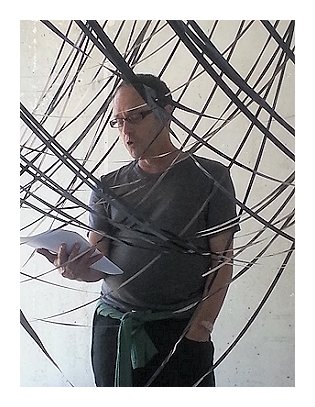
Zo was het genoeg voor één dag. De ingeperkte koningsdochter “als verlengstuk van de moeder” (p. 14 in de voordracht van Pitollo eerder op de dag) groeide in Naudés voordracht onbedoeld uit tot een grandioze waterval met de naam Victoria. Mijn verstand zei nog: ga luisteren naar Jules Deelder, maar mijn beker was vol. Die dichters die op deze dag uitkwamen als de lievelingen van de pers waren Naudé en Deelder, elk met een artikel in het NRC Handelsblad. In het najaar van 2014 zal Naudés Al die lieflike dade bij Uitgeverij Tafelberg verschijnen. De laatste bundel van Deelders was Ruisch (De Bezige Bij, 2011).
Foto’s: Carina van der Walt
1 – Dichteressen Kreek Daey Ouwens en Emma Crebolder aan de zij van deelnemende dichter Antoine de Kom
2 – De Franse dichteres Veronique Pitollo in gesprek met Dean Bowen in DE Café
3 – De Turkse dichter Roni Margulies vertelt van zijn ervaringen als “writer in residence” de afgelopen zes weken in Rotterdam Zuid.
4 – Charl-Pierre Naudé en zijn vertaler Robert Dorsman.
5 – De Zuid-Afrikaanse dichter Charl-Pierre Naudé op het podium.
Carina van der Walt over Poetry International 2014
fleursdumal.nl magazine
More in: Archive W-X, Archive W-X, Art & Literature News, Carina van der Walt, Poetry International, TRANSLATION ARCHIVE, Walt, Carina van der
Thank you for reading Fleurs du Mal - magazine for art & literature